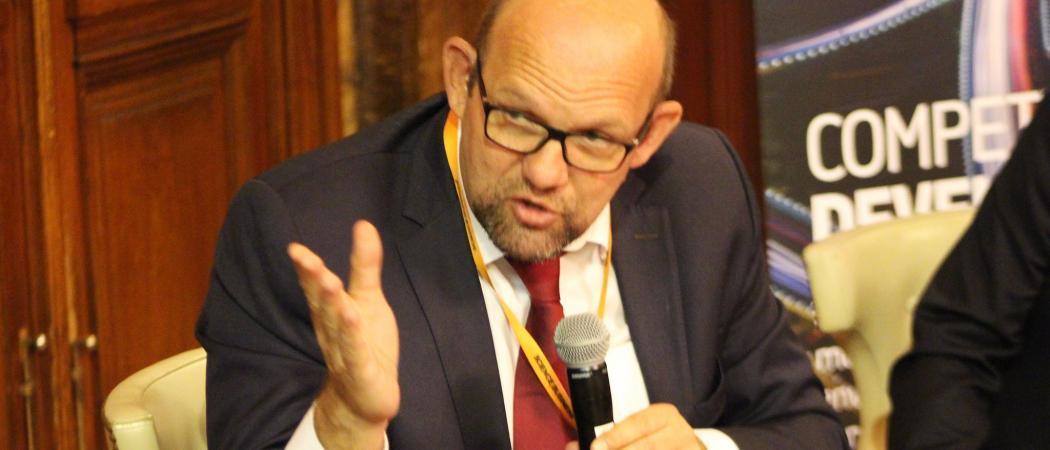EIC Director Jean-David Malo lifts some of the mystery around the European Innovation Council Equity Fund launched last month

Jean-David Malo, director of the Commission’s task force planning the EIC. Photo: Lysiane Pons, Science|Business.
The European Innovation Council (EIC) equity fund, formally launched at the end of June, is now positioned to make its first investments in life sciences and tech start-ups, after prequalifying 102 SMEs.
The first companies to receive this new type of European funding will be those that are most in need, said Jean-David Malo, the director of the EIC Taskforce. “For some companies, there is no need to rush, for others it’s required more quickly,” he told Science|Business.
By the end of the year, the new venture fund is expected to have invested around €500 million in European start-ups.
The EIC equity fund, the first public investment fund of such scale, has different goals from those of private funds, which primarily focus on return on investment. “The purpose is to de-risk the investment for the private sector,” said Malo. EIC money will enable companies to carry out additional work to shape up products and establish their operations, making it possible to pull private venture firms into later funding rounds, with EIC making an exit when that happens.
There are to be exceptions to the rule, with EIC remaining invested if foreign capital is trying to buy up companies working in strategically important areas, such as cybersecurity, or which are important for the technological sovereignty of the EU.
To give it the power of veto, EIC may “tak[e] golden shares in the company,” said Malo.
Changes ahead
The EIC is in pilot phase until the end of the year, meaning the rules under which it operates are yet to be set in stone. For a start, it is unclear whether the fully-fledged EIC will be run as part of the research and innovation directorate in the commission, or act as a separate executive agency.
Forming an agency with broad responsibility for innovation is under consideration, Malo said. “This executive agency is expected to host the activities that are related to the EIC, [along with] the innovation ecosystem of Horizon Europe, as well as to centrally manage place-based innovations of the structural funds.” For now, the new agency is in the planning stages.
Alongside deliberations over EIC’s exact role, changes are being made to the decision-making processes for selecting start-ups to receive equity financing.
A report by the EIC advisory board last week criticised the equity fund’s application process, saying it is too difficult. The EIC together with the board is working to fix this.
One idea is to set up a shadow programme committee of member states to pre-select the most promising companies. These companies would be provided with training and support to help them draw up business plans and present more robust proposals for the next stage of the selection process, in which the European Investment Bank (EIB) manages due diligence as an adviser to EIC. “We are working on this. The idea would be to launch it in the beginning of Horizon Europe,” said Malo.
Currently, all submitted proposals are considered by the EIB and forwarded to EIC, which makes the final decision. The EIB also negotiates draft financing terms with the start-ups and any co-investors that are involved.
To expand its capacity, EIC aims to appoint two more programme managers, to oversee portfolios of different types of companies. Two current programme managers are responsible for health and IT sector investments. One new manager will handle green deal investments, while the role of the second is yet to be determined.
High demand
Since its formation in 2017, over 10,000 companies have applied for a total of €28 billion in equity financing from the EIC. In the last call, themed around the green deal, 2,000 proposals were seeking over €7.8 billion.
The results of the green deal call will be announced in the next ten days. Another batch of companies will be selected in November.
Demand for equity financing is higher than initially expected, and the COVID-19 crisis has increased demand further, Malo said. As part of its first post-COVID call, EIC handed out the largest sum to date, investing €174 million to buy equity in 46 companies.
“When we launched the idea of the EIC several years ago, everybody was very sceptical, for good or bad reasons,” said Malo. “Now, you see that the role of public authorities and states in support[ing] the recovery of the economy is absolutely crucial.”
The future size of the fund remains unclear. Once the budget for the EIC under the next EU seven-year budget is agreed, it will be easier to estimate. With the currently proposed €10 billion budget, around €3 - €3.5 billion would be invested in equity. “These are things that we are currently contemplating,” said Malo.
Because of the uncertain budget, Malo said he cannot share estimates for return on investment. “We have a return in mind, but we don’t want to communicate it,” he said. Some companies may take ten years to produce a return, which makes it difficult to assess the overall level of return on the equity fund, he said.





 A unique international forum for public research organisations and companies to connect their external engagement with strategic interests around their R&D system.
A unique international forum for public research organisations and companies to connect their external engagement with strategic interests around their R&D system.